Blog del Instituto Cervantes de Dublín
Torre Martello
Hoy leemos con | Today we are reading with: Ita Daly, Rafael Gumucio, Maighréad Medbh, Lorenzo Silva.
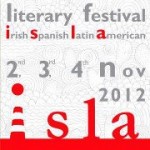 Para finalizar el Festival Literario ISLA, os ofrecemos unas lecturas en el Café Literario, el 4 de Noviembre a las 12.45.
Para finalizar el Festival Literario ISLA, os ofrecemos unas lecturas en el Café Literario, el 4 de Noviembre a las 12.45.
Última lectura del festival que clausura este festín literario con las voces de estos cuatro escritores que leerán una selección de su obra en su lengua original. Presenta: Megan Specia.
Ita Daly (Drumshanbo, Leitrim, Irlanda) ha publicado cinco novelas, una colección de cuentos y dos libros infantiles. Ha recibido el premio Hennessy Literary Award y el Irish Times Short Story Award. Su obra ha sido traducida al sueco, danés, japonés, italiano y alemán y sus relatos cortos han aparecido en revistas de Irlanda, Inglaterra y Estados Unidos. Uno de sus libros de relatos, The Lady With the Red Shoes, forma parte del plan de estudios de las escuelas de secundaria alemanas.
Rafael Gumucio (Santiago, Chile, 1970) es escritor y profesor de castellano y se licenció en Literatura por la Universidad de Chile. Ha trabajado como periodista en varios diarios. En 1995 publicó el libro de relatos Invierno en la Torre y Memorias Prematuras. Ha publicado también las novelasComedia Nupcial, Los Platos Rotos y Páginas Coloniales. Su última novela es La Deuda (2009). Actualmente es Director del Instituto de Estudios Humorísticos de la Universidad Diego Portales y co-conductor del programa Desde Zero en Radio Zero. Ha recibido el premio Anna Seghers, Alemania, 2002.
Máighréad Medbh (Condado de Limerick, Irlanda) ha publicado cinco libros de poesía y un audiolibro. Fue pionera de la performance poética en Irlanda en los años 90. Su colección más reciente es Twelve Beds for the Dreamer (2010). La obra de Máighréad ha sido publicada en una gran variedad de antologías y ha escrito versiones de poemas gallegos para dos antologías recientes editadas por Manuela Palacios (Universidad de Santiago de Compostela).
Lorenzo Silva (Madrid, España, 1966) ha escrito, entre otras, las novelas La flaqueza del bolcheviqueque ha sido llevada al cine por Manuel Martín Cuenca, y Carta blanca. Ha publicado también libros infantiles y juveniles, además de ensayos. Es especialmente conocido por la serie policíaca protagonizada por los investigadores Bevilacqua y Chamorro, iniciada conEl lejano país de los estanques (Premio Ojo Crítico 1998), y a la que siguió, entre otras, El alquimista impaciente (Premio Nadal 2000). Su último libro es Niños Feroces (2011). Su obra ha sido traducida a numerosos idiomas, como ruso, francés, alemán, italiano o griego.
To close the ISLA Literary Festival, we offer some readings at Café Literario, in November 4th at 12:45.
This literary festival will close with poetry readings by these four writers in their original language. Introduced by: Megan Specia.
(Drumshambo, Co. Leitrim) has published five novels, one collection of short stories and two books for children. She has won two Hennessy Literary Awards and an Irish Times Short Story Award. Her last novel, Unholy Ghosts (1997), was long listed for the International IMPAC Dublin Literary Award. Her work has been translated into Swedish, Danish, Japanese, Italian and German and her short stories have appeared in magazines in Ireland, England and America. Her short story collection The Lady With the Red Shoes (1980) is currently on the secondary school curriculum in Germany.
Rafael Gumucio (Santiago, Chile, 1970) has worked as a journalist for many Chilean and Spanish newspapers, as well as the New York Times. In 1995 he published the collection of short stories Invierno en la Torre and Memorias prematuras. He also published the novels Comedia Nupcial, Los Platos Rotos and Páginas Coloniales. His latest novel, La Deuda, was published in 2009. He now works as the director of the Institute for Humour Studies of the University Diego Portales and is co-conductor of Desde Zero at the radio station Zero. He received the Anna Seghers Award in Germany in 2002.
Máighréad Medbh (Co. Limerick) has five published poetry collections and an audio CD. She was a pioneer of performance poetry in Ireland in the nineteen-nineties. Her most recent collection, Twelve Beds for the Dreamer was published in 2010. Máighréad has been published in a wide range of anthologies, and has written versions of Galician poems for two recent anthologies edited by Manuela Palacios of Universidad de Santiago de Compostela.
Lorenzo Silva (Madrid, Spain, 1966) is author of novels such as La Flaqueza del Bolchevique which was adapted for cinema by Manuel Martín Cuenca, and Carta Blanca. He has also published books for children and young adults, as well as essays. He is especially known for the crime series starring detectives Bevilacqua and Chamorro, the series started with El lejano país de los estanques winner of the Ojo Crítico Award in 1998, and was followed by El Alquimista Impaciente winner of the Nadal Award in 2000, the later being adapted to cinema by Patricia Ferreira. His latest book Niños Feroces was published in 2011. His books have been translated into numerous languages such as Russian, French, German, Italian and Greek.
Mesa redonda | Round table discussion: Palabras e imágenes, cine y literatura. (Words and images, cinema and literature)
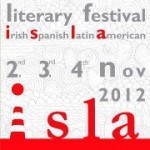 Comenzamos el último día del Festival Literario ISLA con una discusión literaria que tendrá lugar a las 11:00 en el Café Literario.
Comenzamos el último día del Festival Literario ISLA con una discusión literaria que tendrá lugar a las 11:00 en el Café Literario.
Cine y literatura, novela gráfica o cómo surgen historias narradas en imágenes y/o palabras serán algunos temas de los invitados Javier Mariscal (diseñador), Fernando Trueba (director de cine) y Mark O’Halloran (actor y guionista). Modera: Ciaran Carty.
Javier Mariscal (Valencia, 1950) es ante todo un creador de imágenes que desarrolla su trabajo en todo tipo de soportes y disciplinas. Junto con el equipo del Estudio Mariscal, que fundó en 1989, ha realizado numerosos proyectos internacionales (H&M, America’s Cup, Camper, etc.), además de la exposición sobre su trabajo Mariscal Drawing Life en el Design Museum de Londres y dos publicaciones monográficas: Mariscal Drawing Life y Sketches. En 2010, ha dirigido junto a Fernando Trueba, Chico y Rita y se ha publicado el cómic Chico & Rita. En 2011 ha publicado también el libro ilustrado Los Garriris.Chico & Rita se ha traducido al inglés en 2011, publicándose también en Francia y Países Bajos.
Mark O’Halloran (Ennis, Condado de Clare) es un dramaturgo, actor y guionista irlandés. Escribió el guión de dos películas muy aplaudidas en la escena cinematográfica: En la primera, Adam and Paul(2004) también asumió unos de los papeles principales, ganando con su trabajo el premio del Festival Internacional de Cine de Gijón al mejor actor (2005) y el Evening Standard British Film Award al mejor guión (2006). Su segunda película, Garage, se estrenó en el Festival de Cine de Cannes en el 2007 y ganó el premio CICAE a la mejor película, así como el Irish Film and Television Award al mejor guión de película (2008), entre muchos otros. También escribió el guión para la serie Prosperity, del canal RTE en 2007, por el cual ganó el Irish Film and Television Award al mejor guión de televisión (2008). Su última obra de teatro Trade se estrenó en el Festival de Teatro del Ulster Bank Dublin en septiembre de 2011.
Fernando Trueba (Madrid, España, 1955) es guionista, editor y director de cine. Entre 1974 y 1979 trabajó como crítico de cine para El País y en 1980 fundó la revista mensual de cine Casablanca, la cual dirigió y editó durante los primeros dos años. En 1992, su película Belle Époque, obtuvo 9 premios Goya y, en 1993, obtiene el Oscar a la mejor película de habla no inglesa. En 1997 publica su libroDiccionario del cine y es editor del Diccionario del Jazz Latino (1998). Recientemente ha llevado al cine, junto al diseñador Javier Mariscal, la película de animación Chico y Rita, que ha recibido el Goya a la mejor película de animación y que ha sido nominada al Óscar como Mejor Película de animación.
To begin the last day of ISLA Literary Festival, we start with a literary discussion that will take place at 11:00 in Café Literario.
Cinema and literature, graphic novel or how stories told in images or words come to life will be some of the topics dealt with by guests Javier Mariscal (designer), Fernando Trueba (cinema director) and Mark O’Halloran (actor, script writer). Chaired by Ciaran Carty.
Javier Mariscal (Valencia, 1950) is, first and foremost, an image creator who develops his work using all kinds of supports and disciplines. Together with the team of Estudio Mariscal, which he founded in 1989, in recent years, and among many other things, he has done several interior design and graphics (H&M, America’s Cup, Camper, etc), the exhibition of his work Mariscal Drawing Life in the Design Museum of London and two monographic publications: Mariscal Drawing Life and Sketches. In 2010, he premiered the full-length cartoon film Chico & Rita which he jointly directed with Fernando Trueba and produced the comic Chico & Rita. In 2011 he published the illustrated book Los Garriris. Chico & Rita has been translated into English in 2011 and has also been published in France and The Netherlands.
Mark O’Halloran (Ennis, Co. Clare) is an Irish playwright, actor and screen writer. He wrote the script for two critically lauded Irish films: On the first one, Adam and Paul (2004), he also took one of the leading roles, winning the Gijón International Film Festival Award for Best Actor (2005) and the Evening Standard British Film Award for Best Screenplay (2006). His second film, Garage, premièred at the Cannes Film Festival in 2007 and won the CICAE award for Best Film and the Irish Film and Television Award for Best Script for Film (2008), among many others. He also wrote the script for the four-part television series Prosperity on RTE in 2007, for which he won the Irish Film and Television Award for Best Script for Television (2008). His latest play Tradepremièred at the Ulster Bank Dublin Theatre Festival in September 2011.
Fernando Trueba (Madrid, Spain, 1955) is a scriptwriter, editor and film director. Between 1974 and 1979 he worked as a film critic for Spain’s national daily newspaper El Pais and in 1980 he founded the monthly film magazine Casablanca, which he directed and edited during its first two years. In 1992, his film Belle Époque received 9 Goya Awards and, in 1993, it was awarded the Oscar for Best Foreign Language film. In 1997 he published the book Diccionario del cine and is the editor of theDiccionario Del Jazz Latino. He has recently broughtChico & Rita to the big screen working with designer Javier Mariscal. This film was awarded the Goya for Best Animated Film, as well as an Academy Award nomination for Best Animated Film.
Proyección | Film Screening: Neruda, el Hombre y su Obra
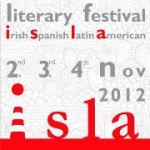 Para terminar el segundo día del Festival de Literatura ISLA os ofrecemos un interesante cortometraje de Neruda. Te esperamos el próximo día 3 de Noviembre a las 18:00 en el Café Literario.
Para terminar el segundo día del Festival de Literatura ISLA os ofrecemos un interesante cortometraje de Neruda. Te esperamos el próximo día 3 de Noviembre a las 18:00 en el Café Literario.
Este documental rescata la memoria, pero también la vigencia de obra y pensamiento de Pablo Neruda, uno de los personajes mas universales de la cultura chilena, y es la primera y única hasta ahora que abarca completamente la vida y obra de este fundamento de la identidad chilena. La cámara recorre Chile y los diversos países del mundo donde Neruda llevó su arte y, con ello la voz de Chile y de lo más genuino de su gente. Además de profundizar en los valores artísticos, el documental aborda aspectos inéditos de Neruda como creador, pensador, amante, luchador social y embajador cultural, lo que convierte este audiovisual en un valioso documento contemporáneo no solo para los chilenos, sino también como un importante patrimonio en el archivo que la cultura mundial debe tener sobre Chile.
To finish the second day of ISLA Literary Festival we offer an interesting short of Neruda. We hope to see you the next November 3rd at 18:00 hrs in Café Literario.
This documentay recovers the memory, but also the validity of Pablo Neruda’s work and thought, one of the most universal characters of Chilean culture, and it is the first and so far only one to include completely the life and work of this foundation of Chilean identity. The camera travels around Chile and the various countries of the world where Neruda took his art, and with it the voice of Chile and of the most genuine of its people. In addition to studying in depth the artistic values, the documentary approaches some of Neruda’s unknown apects as a creator, thinker, lover, social fighter and cultural ambassador, which makes this film a valuable contemporary document not only for the Chilean, but also as an important heritage to the archive that world culture must have about Chile.
Mesa redonda: Conflictos: ficción, humor y sociedad | Round table discussion: Conflicts: fiction, humour and society
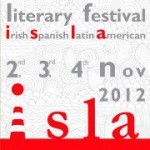 Como todos sabéis, hoy estrenamos festival, el Festival ISLA de Literatura, a las cuatro de la tarde, que será inaugurado oficialmente, a las 6:30, por el presidente de Irlanda, Sr. Michael D. Higgins.
Como todos sabéis, hoy estrenamos festival, el Festival ISLA de Literatura, a las cuatro de la tarde, que será inaugurado oficialmente, a las 6:30, por el presidente de Irlanda, Sr. Michael D. Higgins.
Mañana sábado, día 3 de noviembre, comenzaremos a las 11:30 con la mesa redonda que lleva por título «Escritores sin escrúpulos: intimidad, violencia y humor en la literatura», y continuaremos con «Cruzando fronteras: Poesía en la maleta». A las 3:30 compartiremos lecturas con varios de nuestros autores y a las 4:30 daremos paso a la mesa redonda «Conflictos: ficción, humor y sociedad», que contará con la participación de Lorenzo Silva, Bernardo Toro y Declan Bruke. Moderará la mesa Kate Quinn, de la Universidad Nacional de Irlanda en Galway.
Lorenzo Silva (Madrid, España, 1966), galardonado con el Premio Planeta hace apenas dos semanas, ha escrito, entre otras, las novelas La flaqueza del bolchevique (finalista del Premio Nadal 1997) que ha sido llevada al cine por Manuel Martín Cuenca, y Carta blanca (Premio Primavera 2004). Ha publicado también libros infantiles y juveniles, además de ensayos. Es especialmente conocido por la serie policíaca protagonizada por los investigadores Bevilacqua y Chamorro, iniciada con El lejano país de los estanques (Premio Ojo Crítico 1998), y a la que siguió, entre otras, El alquimista impaciente (Premio Nadal 2000), adaptada al cine por Patricia Ferreira. Su último libro publicado es Niños Feroces (2011). Su obra ha sido traducida a numerosos idiomas.
Bernardo Toro (Santiago, Chile) es un escritor radicado en Francia. En 1983 salió de Chile para continuar sus estudios en París, donde realizó un máster sobre la obra de Marcel Proust en la Universidad de La Sorbona. Entre 1988 y 1993, dirigió la revista de arte Lugares Extremos. Desde 1999 dirige la revista Rue Saint Ambroise, publicación dedicada al cuento contemporáneo. Actualmente es profesor y traductor literario. Es autor de dos novelas: Contretemps (A Contratiempo) (Les petits matins, 2006) y De fils à fils (De hijo a hijo) (Sotck, 2010). Su próxima novela, Qui d’autre à part nous, se publicará en el 2013.
Declan Burke ha publicado cuatro novelas hasta el día de hoy: Eightball Boogie (2003), The Big O (2007), Absolute Zero Cool (2011) y Slaughter’s Hound (2102). Absolute Zero Cool fue una de las finalistas en la categoría de novela negra para el premio Irish Book 2011 y recibió el premio Goldsboro Last Laugh a la mejor novela negra humorística en 2012. Es además el editor de These Green Streets: Irish Crime Writing in the 21st Century (2011) y co-editor, junto a John Connolly, de Books to Die For( 2012). Tiene una página web dedicada a la novela negra irlandesa llamada Crime Always Pays.
Cerraremos el día con la proyección del documental Neruda, el hombre y su obra.
We invite you to participate in a the round-table “Conflicts: fiction, humour and society” as part of the ISLA Festival. The event will be held the 3rd of November at 16:30 at Café Literario.
Historical memory, national or international conflicts and crime and daily life will be topics at this table thanks to literary works by guests Lorenzo Silva, Bernardo Toro and Declan Burke. Chaired by Kate Quinn (NUI Galway).
Lorenzo Silva (Madrid, Spain, 1966) is author of novels such as La Flaqueza del Bolchevique which was short listed for the Nadal Award in 1997, and was adapted for cinema by Manuel Martín Cuenca, andCarta Blanca which won the Primavera Award in 2004. He has also published books for children and young adults, as well as essays. He is especially known for the crime series starring detectives Bevilacqua and Chamorro, the series started with El lejano país de los estanques winner of the Ojo Crítico Award in 1998, and was followed by El Alquimista Impaciente winner of the Nadal Award in 2000, the later being adapted to cinema by Patricia Ferreira. His latest book Niños Feroces was published in 2011. His books have been translated into numerous languages such as Russian, French, German, Italian and Greek.
Bernardo Toro (Santiago, Chile) lives in France. He left Chile in 1983 to complete a masters degree at the Sorbonne University of Paris with a dissertation about Marcel Proust´s work. From 1988 to 1993 he was editor in chief of the art magazine Lugares Extremos. Since 1999, while working as lecturer and literary translator, he has been editor in chief of the magazine Rue Saint Ambroise, a publication dedicated to contemporary short stories. He is the author of two novels: Contretemps (2006) and De fils à fils (2010). His next novel, Qui d’autre à part nousis due for release in 2013.
Declan Burke has published four novels to date:Eightball Boogie (2003), The Big O (2007), Absolute Zero Cool (2011) and Slaughter’s Hound (2102).Absolute Zero Cool was shortlisted in the crime fiction section for the Irish Book Awards 2011, and received the Goldsboro Last Laugh Award for Best Humorous Crime Novel in 2012. He also is the editor of Down These Green Streets: Irish Crime Writing in the 21st Century (2011), and the co-editor, with John Connolly, of Books to Die For (2012). He hosts a website dedicated to Irish crime fiction called Crime Always Pays.
Elia Barceló, nuestra autora del mes en el Festival ISLA / Elia Barceló, our author of the month
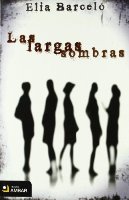 Elia Barceló (Alicante, 1957) estará con nosotros en el Festival ISLA de Literatura los días 2 y 3 de noviembre. Por eso, y para que conozcas un poco mejor su obra, la hemos seleccionado como autora del mes de noviembre en nuestra biblioteca.
Elia Barceló (Alicante, 1957) estará con nosotros en el Festival ISLA de Literatura los días 2 y 3 de noviembre. Por eso, y para que conozcas un poco mejor su obra, la hemos seleccionado como autora del mes de noviembre en nuestra biblioteca.
Elia Barceló reside en Austria desde 1981 donde es profesora de literatura hispánica.
Su campo de investigación es la literatura fantástica, de ciencia ficción y de terror, así como la narrativa argentina y cubana del siglo XX, la novela negra y la literatura juvenil en España. Se la considera una de las escritoras más importantes, en lengua castellana, del género de la ciencia-ficción, junto con la argentina Angélica Gorodischer y la cubana Daína Chaviano. Las tres forman la llamada “trinidad femenina de la ciencia-ficción en Hispanoamérica”.
Ha publicado novelas, ensayo y unos cuarenta relatos. Parte de su obra ha sido traducida al francés, italiano, alemán, catalán, inglés, griego, húngaro, holandés, danés, noruego, sueco y esperanto.
Elia Barceló (Alicante, 1957) is our author of the month in November. She will be with us in the ISLA Literary Festival the 2nd and the 3rd of November, so you have a good chance to know better her literary works.
She lives in Austria since 1981 where she teaches Spanish Literature. Her field of activity is Fantastic Literature, Science Fiction and Horror. She´s also interested in the Argentinian and Cuban narrative of the XX century, crime fiction and books for children and young adults.
She has published novels, essays and over forty short-stories. Part of her work has been translated into French, Italian, German, Catalan, English, Greek, Hungarian, Dutch, Danish, Norgewian and Esperanto.
Hoy leemos con | Today we are reading with: Elia Barceló, Kevin Barry, Christopher Domínguez Michael, Keith Ridgway and María Negroni
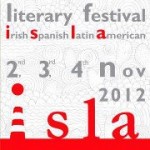 Ya solo quedan tres días para que de comienzo el esperado Festival ISLA de Literatura. Dentro de su programación, el sábado 3 de noviembre podremos disfrutar de un recital poético que dará comienzo a las tres y media de la tarde en nuestro Café Literario.
Ya solo quedan tres días para que de comienzo el esperado Festival ISLA de Literatura. Dentro de su programación, el sábado 3 de noviembre podremos disfrutar de un recital poético que dará comienzo a las tres y media de la tarde en nuestro Café Literario.
Elia Barceló, Kevin Barry, Christopher Domínguez Michael, Keith Ridway y María Negroni compartirán sus mejores textos con los asistentes al acto y unirán sus voces a este festival. La presentación, en este caso, correrá a cargo de Lorraine Kelly, de la Universidad de Galway (National University of Ireland). Pero, ¿quiénes son estos autores?, ¿no los conoces todavía?.
Elia Barceló (Alicante, España, 1957) ha publicado novelas policíacas, históricas, de ciencia ficción y género fantástico para adultos, así como novelas para jóvenes y ensayos. Ha sido traducida a diecisiete idiomas, entre ellos el inglés. Sus novelas traducidas al inglés hasta la fecha son: Corazón de tango (2007) (Heart of Tango, 2010) y El secreto del orfebre (2003) (The Goldsmith’s Secret, 2011).
Kevin Barry (Limerick). Su primer libro de relatos,There are Little Kingdoms, ganó el Premio Rooney de Literatura Irlandesa en 2007. Ha escrito sobre viajes y literatura para The Guardian, The Irish Times, The Sydney Morning Herald y muchas otras publicaciones. Su primera novela, City of Bohane (2011) ha sido galardonada en Reino Unido con el Authors’ club Best First Novel Award, que premia a la mejor primera novela del año.
Christopher Domínguez Michael (Ciudad de México, México, 1962), historiador y ensayista, es uno de los más conocidos críticos literarios hispanoamericanos. Es autor de numerosas publicaciones, siendo su última publicación Profetas del pasado. Quince voces sobre la historiografía de México (2011). Su Diccionario crítico de la literatura mexicana, 1955–2005 ha sido traducido y actualizado al inglés en 2012.
Keith Ridgway (Dublín, Irlanda, 1965). Su primera obra de ficción fue Horses (1997), a la que siguieronThe Long Falling (1998), Standard Time (2000); un libro de relatos, The Parts (2003); Animals (2006) yGoo Book (2011). Su última novela publicada esHawthorn & Child (2012). Ha recibido numerosos premios, entre ellos el Prix Femina Etranger y el Prix Premier Roman en París en 2001 por The Long Fallingbajo el título en francés Mauvais Pente, y el premio Rooney de literatura irlandesa en 2001. Las obras de Ridgway han sido traducidas a varios idiomas entre otros, el español.
María Negroni (Rosario, Argentina, 1951) es poeta, ensayista y novelista. Como poeta, ha publicado, entre otros libros: El viaje de la noche, Arte y Fuga,La Boca del Infierno y Cantar la nada. También ha publicado varios libros de ensayos y dos novelas. Su libro Islandia recibió el premio del PEN American Center en Nueva York al mejor libro de poesía en traducción del año (2001) y Galería Fantástica recibió el Premio Internacional de Ensayo de Siglo XXI (México). Su obra ha sido traducida al inglés, francés, sueco e italiano.
This event of ISLA Literary Festival will be an outstanding poetry reading in November 3rd at 3:30 at Café Literario.
Authors will read a selection of some of their best work in their original language in this poetry reading. Introduced by: Lorraine Kelly (NUI Galway).
Elia Barceló (Alicante, Spain, 1957) has published crime, historical, science fiction and fantastic novels for adults, as well as young adult books and essays. Her work has been translated into several languages, Spanish between others. Her novels translated into English are: Corazón de tango (2007), translated into English under the name Heart of Tango (2010) andThe Goldsmith’s Secret (2011), a translation of El secreto del orfebre (2003).
Kevin Barry was born in Limerick and now lives in Sligo. His first collection of short stories, There Are Little Kingdoms, won the Rooney Prize for Irish Literature in 2007. He has written about travel and literature for The Guardian, The Irish Times, The Sydney Morning Herald and many other publications. His debut novel City of Bohane (2011) recently won the Authors’ Club Best First Novel award in Britain.
Christopher Domínguez Michael (Mexico City, Mexico, 1962) is a historian and essayist, and also one of the most famous Hispanic-American literary critics. He is the author of several works, being his latest novel Profetas Del Pasado. Quince Voces Sobre La Historiografía De México was published in 2011. Since 2010 he has also worked as associate researcher at the Colegio de México. His workDiccionario Crítico de la Literatura Mexicana, 1955-2005 (Critical Dictionary of Mexican Literature, 1955–2010) has been translated into English and was updated in 2012.
María Negroni (Rosario, Argentina, 1951) is a poet, essayist and novelist. She has published numerous poetry books: Islandia, El viaje de la noche, Arte y Fuga, La Boca del infierno and Cantar la nada, to mention just a few. She has also published various essays collections and two novels. Her book Islandiareceived the 2001 PEN American Center Award for best book of poetry in translation. She was awarded the 21st Century International Essay Prize (Mexico) for her book Galería Fantástica. Her work has been translated into English, French, Swedish and Italian.
Keith Ridgway (Dublin, 1965). His first fictional prose Horses was published in 1997, followed by The Long Falling (1998), Standard Time (2000). A collection of short fiction, The Parts (2003), Animals(2006), Goo Book (2011) and Hawthorn & Child(2012). He has received numerous awards such as the Prix Femina Etranger and the Prix Premier Roman in Paris in 2001 for The Long Falling, under its French title of Mauvaise Pente, and The Rooney Prize For Irish Literature in 2001. His work has been translated into several languages and has been published in Spain, between other countries.
Mesa redonda: Cruzando fronteras: Poesía en la maleta | Round table discussion: Crossing frontiers: Poetry in the suitcase
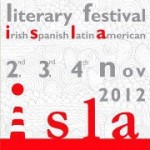 Le invitamos a una interesante discusión literaria que tendrá lugar el 3 de Noviembre a las 14:00, Festival Literario ISLA.
Le invitamos a una interesante discusión literaria que tendrá lugar el 3 de Noviembre a las 14:00, Festival Literario ISLA.
La poesía llega al festival ISLA con los autores Omar Pérez, Diego Valverde Villena, Máighréad Medbh y Lorna Shaughnessy. Cuatro formas de construir desde lo poético para enriquecer el panorama contemporáneo. Modera: Catherine O’Leary (NUI Maynooth)
Omar Pérez (La Habana, Cuba, 1964) es poeta, ensayista y traductor, además de periodista, crítico de teatro y cine, editor y locutor de radio. Su última publicación es la colección de ensayos El corazón mediterráneo (2011). Como poeta ha publicado Algo de lo sagrado (1996), ¿Oíste hablar del gato de pelea? (1999), Canciones y Letanías (2002) y Lingua Franca (2009). En inglés ha publicado Something of the Sacred (2007), traducción de Algo de lo sagrado, a cargo de Kristin Dykstra y Did you hear about the fighting cat? (2010).
Diego Valverde Villena (Lima, Perú, 1967). Poeta español y peruano, de ascendencia boliviana. En 2011 publicó su libro de poemas Un segundo de vacilación. Ha traducido obras de Conan Doyle, Kipling, John Donne, Ezra Pound, Valery Larbaud, Nuno Júdice, E.T.A. Hoffmann y Paul Celan, entre otros. Sus poemas aparecen en numerosas antologías y han sido traducidos a varios idiomas, entre ellos al irlandés. Entre sus principales obras de poesía se encuentran: El difícil ejercicio del olvido(1997), No olvides mi rostro (2001) y El espejo que lleva mi nombre escrito (2006).
Máighréad Medbh (Condado de Limerick, Irlanda) ha publicado cinco colecciones de poesía y un audiolibro. Fue pionera de la performance poética en Irlanda en los años 90. Su colección más reciente esTwelve Beds for the Dreamer (2010). Máighréad ha sido publicada en una gran variedad de antologías y ha escrito versiones de poemas gallegos para dos antologías recientes editadas por Manuela Palacios de la Universidad de Santiago de Compostela. Durante el festival, Máighréad presentará una mezcla de obras nuevas y algunas de Twelve Beds for the Dreamer y When the Air Inhales You.
Lorna Shaughnessy (Belfast, Irlanda del Norte, 1961) es poeta, traductora y profesora de Lengua Española en la Universidad Nacional de Irlanda, Galway. Ha publicado dos libros de poemas, Torching the Brown River (2009) y Witness Trees (2011) y dos traducciones de poesía contemporánea mexicana,Mother Tongue. Selected Poems by Pura López Colomé y If We Have Lost our Oldest Tales, de María Baranda (2006). Su traducción de The Disappearance of Snow de Manuel Rivas fue publicada en 2012.
You’re invited to an interesting literary discussion in November 3rd at 14:00, ISLA Literary Festival.
Poetry arrives at ISLA festival with authors Omar Pérez, Diego Valverde Villena, Máighréad Medbh and Lorna Shaughnessy. Four ways to build from poetry to enrich contemporary work. Chaired by Catherine O’Leary (NUI Maynooth).
(Havana, Cuba, 1964) is a poet, essayist and translator, as well as a journalist, theatre and film critic, editor and radio presenter. His last publication was the collection of essays El corazón mediterráneo (2011). As a poet he publishedAlgo de lo sagrado (1996), ¿Oíste hablar del gato de pelea? (1999), Canciones y Letanías (2002) andLingua Franca (2009). In English publishedSomething of the Sacred (2007), the translation ofAlgo de lo Sagrado by Kristin Dykstra, and Did You Hear About The Fighting Cat? (2010).
Diego Valverde Villena (Lima, Peru, 1967) is a Spanish and Peruvian poet of Bolivian descent. In 2011 he published his book of poems Un segundo de vacilación. He has translated, among others, works of Conan Doyle, Joseph Rudyard Kipling, John Donne, Ezra Pound, Valery Larbaud, Nuno Júdice, E.T.A. Hoffmann and Paul Celan. His poems appear in many compilations and have been translated into several languages, including Irish. His most famous works in poetry are El difícil ejercicio del olvido (1997), No olvides mi rostro (2001) and El espejo que lleva mi nombre escrito (2006).
Máighréad Medbh (Co. Limerick) has five published poetry collections and an audio CD. She was a pioneer of performance poetry in Ireland in the nineteen-nineties. Her most recent collection, Twelve Beds for the Dreamer was published in 2010. Máighréad has been published in a wide range of anthologies, and has written versions of Galician poems for two recent anthologies edited by Manuela Palacios of Universidade de Santiago de Compostela. During the festival, Máighréad will be presenting a mix of new work and some from Twelve Beds for the Dreamer and When the Air Inhales You.
Lorna Shaughnessy (Belfast, Northern Ireland, 1961) is a poet, translator and lecturer in Spanish in the National University of Ireland, Galway. She has published two collections of poems, Torching the Brown River (2009) and Witness Trees (2011) and two translations of contemporary Mexican poetry,Mother Tongue: Selected Poems by Pura López Colomé and If We Have Lost our Oldest Tales by María Baranda, (2006). Her translation of Manuel Rivas’ The Disappearance of Snow, was published in 2012.
Mesa Redonda: Escritores sin escrúpulos: Intimidad, violencia y humor en la literatura | Round table discussion: Writers without scruples: Intimacy, violence and humour in literature
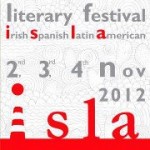 La primera actividad en el Festival Literario ISLA será una discusión literaria, que tendrá lugar el 3 de Noviembre a las 11:30 en el Café Literario.
La primera actividad en el Festival Literario ISLA será una discusión literaria, que tendrá lugar el 3 de Noviembre a las 11:30 en el Café Literario.
Temas como la identidad y la memoria, la violencia o el humor serán tratados por los invitados Ita Daly, Christopher Domínguez Michael, Rafael Gumucio y Catherine Dunne, con la moderación de Ciaran Cosgrove (Trinity College Dublin).
Ita Daly (Drumshanbo, Leitrim, Irlanda) ha publicado cinco novelas, una colección de cuentos y dos libros infantiles. Ha recibido el premio Hennessy Literary Award y el Irish Times Short Story Award. Su obra ha sido traducida al sueco, danés, japonés, italiano y alemán y sus relatos cortos han aparecido en revistas de Irlanda, Inglaterra y Estados Unidos. Uno de sus libros de relatos, The Lady With the Red Shoes, forma parte del plan de estudios de las escuelas de secundaria alemanas.
Christopher Domínguez Michael (Ciudad de México, México, 1962), historiador y ensayista, es uno de los más conocidos críticos literarios hispanoamericanos. Es autor de numerosas publicaciones, siendo su última publicación Profetas del pasado. Quince voces sobre la historiografía de México (2011). Es miembro del Sistema Nacional de Creadores de Arte desde 1993. Su Diccionario crítico de la literatura mexicana, 1955–2005 ha sido traducido y actualizado al inglés en 2012.
Rafael Gumucio (Santiago, Chile, 1970) ha trabajado como periodista en numerosos diarios nacionales chilenos, españoles y en el New York Times. En 1995 publicó el libro de relatos Invierno en la Torre y Memorias Prematuras. Ha publicado también las novelas Comedia Nupcial, Los Platos Rotos y Páginas Coloniales. Su última novela es La Deuda (2009). Actualmente es Director del Instituto de Estudios Humorísticos de la Universidad Diego Portales y co-conductor de Desde Zero en Radio Zero.
Catherine Dunne (Dublín, 1954), estudió inglés y español en Trinity College de Dublín. Su primera novela, In the Beginning, fue publicada en 1997. Le siguió A Name for Himself, finalista del premio Kerry Fiction Prize. Ha publicado otras seis novelas, The Walled Garden (2000), Another Kind of Life (2003), Something Like Love (2006), At a Time Like This(2007), Set in Stone (2009), Missing Julia (2011) y el ensayo An Unconsidered People: The Irish in Sixties London (2003). Sus novelas The Walled Garden (El jardín vallado) y A Name for Himself (Un nombre propio) han sido traducidas al español.
The first event in 3rd November of ISLA Literary Festival is a literary discussion, and it will take place at Café Literario at 11:30.
Topics such as identity and memory, violence or humour will be dealt with by guests Ita Daly, Christopher Domínguez Michael, Rafael Gumucio and Catherine Dunne, chaired by Ciaran Cosgrove (Trinity College Dublin).
Ita Daly (Drumshambo, Co. Leitrim) has published five novels, one collection of short stories and two books for children. She has won two Hennessy Literary Awards and an Irish Times Short Story Award. Her last novel, Unholy Ghosts (1997), was long listed for the International IMPAC Dublin Literary Award. Her work has been translated into Swedish, Danish, Japanese, Italian and German and her short stories have appeared in magazines in Ireland, England and America. Her short story collection The Lady With the Red Shoes (1980) is currently on the secondary school curriculum in Germany.
Christopher Domínguez Michael (Mexico City, Mexico, 1962) is a historian and essayist, and also one of the most famous Hispanic-American literary critics. He is the author of several works, being his latest novel Profetas Del Pasado. Quince Voces Sobre La Historiografía De México was published in 2011. He is a member of the Sistema Nacional de Creadores de Arte (National System for Art Creators) since 1993. His work Diccionario Crítico de la Literatura Mexicana, 1955-2005 (Critical Dictionary of Mexican Literature, 1955–2010) has been translated into English and was updated in 2012.
Rafael Gumucio (Santiago, Chile, 1970) has worked as a journalist for many Chilean and Spanish newspapers, as well as the New York Times. In 1995 he published the collection of short stories Invierno en la Torre and Memorias prematuras. He also published the novels Comedia Nupcial, Los Platos Rotos and Páginas Coloniales. His latest novel, La Deuda, was published in 2009. He now works as the director of the Institute for Humour Studies of the University Diego Portales and is co-conductor of Desde Zero at the radio station Zero. He received the Anna Seghers Award in Germany in 2002.
Catherine Dunne (Dublin, 1954). She studied English and Spanish at Trinity College, Dublin. Her first novel, In the Beginning, was published in 1997. A Name for Himself followed a year later, and was short listed for the Kerry Fiction Prize. She has published six further novels, The Walled Garden (2000),Another Kind of Life (2003), Something Like Love(2006), At a Time Like This (2007), Set in Stone(2009), Missing Julia (2011) and the non-fiction bookAn Unconsidered People: The Irish in Sixties London(2003). Her novels The Walled Garden (El jardín vallado) and A Name for Himself (Un nombre propio) have been translated into Spanish.
Festival Literario ISLA / ISLA Literary Festival
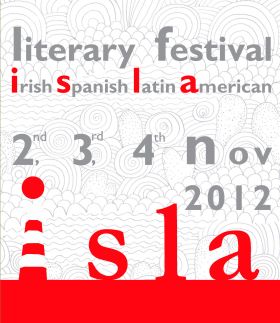 Irlanda es una isla grande y fértil. Una isla sembrada de escritores y de buena literatura. Un escritor, en algún momento de su labor creativa, también ha de convertirse en una isla, retirarse en silencio hasta el lugar en donde se encuentran las palabras, esas mismas palabras que luego descubrirá algún lector solitario, como un tesoro en una isla pirata, un tesoro en forma de libro.
Irlanda es una isla grande y fértil. Una isla sembrada de escritores y de buena literatura. Un escritor, en algún momento de su labor creativa, también ha de convertirse en una isla, retirarse en silencio hasta el lugar en donde se encuentran las palabras, esas mismas palabras que luego descubrirá algún lector solitario, como un tesoro en una isla pirata, un tesoro en forma de libro.
Un buen libro es una isla que contiene el universo.
ISLA es también el nombre que hemos querido dar a nuestro festival de literatura. Es el acrónimo de “Irish, Spanish and Latin American” Literary Festival. Es por tanto, también, una ISLA grande, fértil y multicultural en la que estamos todos unidos, irlandeses, latinoamericanos y españoles, por primera vez, en torno a la literatura.
Nunca antes se había celebrado un festival de estas características. Sin embargo, creemos que hacía ya mucho tiempo que venía siendo necesario. Hoy, gracias al entusiasmo demostrado tanto por Dublin UNESCO City of Literature, Ireland Literature Exchange, Poetry Ireland y el apoyo de las universidades Dublin City University, NUI Galway, NUI Maynooth y Trinity College Dublin, como por las embajadas de Argentina, Chile, Cuba, México y por supuesto por la Embajada de España, de la que el Instituto Cervantes forma parte, este festival es una realidad. Solo podemos tener palabras de agradecimiento para todos ellos.
Y aquí estamos todos, unidos en este proyecto. Comprometidos, comunicados, reunidos en este hermoso territorio común en el que hemos depositado tantas ilusiones.
No tiene sentido que algunas de las literaturas más fecundas del planeta sigan viviendo de espaldas entre sí. Es necesario que del intercambio de experiencias e ideas, de un mejor conocimiento entre unos y otros surjan nuevas traducciones, nuevos libros y, sobre todo, nuevos lectores.
Bienvenidos a nuestra ISLA.
Ireland is a great and fertile Island. It is an Island cultivated with writers and high quality literature. A writer during the course of his creative work must also become an island, withdrawing in silence to a place where words are kept. Those same words which some solitary reader will discover like hidden treasure on a pirate island, treasure in the form of a book.
A good book is a universe within an island.
The Spanish for ‘island’ is ‘ISLA’. It is the name we have chosen for our Literary Festival. It is the acronym for ‘Irish, Spanish and Latin American’ Literary Festival. It is also in that way a great, fertile and multicultural island where the Irish, Latin Americans and Spanish for the first time are all united and gathered around literature.
Never before has such a festival taken place. However, we believe it to be a much needed, unique event that has been a long time coming. Today, and thanks to the enthusiasm of Dublin UNESCO City of Literature, Ireland Literature Exchange, Poetry Ireland and the support of Dublin City University, Trinity College Dublin, NUI Galway, NUI Maynooth, the Embassies of Argentina, Mexico, Chile and Cuba, and by the Spanish Embassy, of which Instituto Cervantes is a part, this Festival is now a reality. We can only offer words of sincere gratitude to all of them.
We are all here, united in this project. Committed, connected and gathered together in this beautiful shared place where we have invested so many dreams.
It does not make sense that some of the most fertile literary figures on the planet should live in disregard for one another. It is imperative that from the exchange of experiences and ideas and from a better understanding between one another, new translations, new literature and, above all, new readers should emerge.
We wish you a warm welcome to our ‘island’ ISLA.



